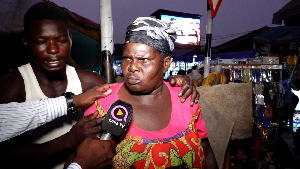Ho, April 1, GNA - The World Bank on Thursday outlined a development dialogue series aimed at promoting a vibrant policy discourse in Ghana for the incorporation of the music industry into the Ghana Poverty Reduction Strategy (GPRS).
The policy would make great distinct and invaluable contribution to economic development, guide the direction of social change and enhance political cohesion and cultural progress, Mr Mats Karlsson, World Bank Country Director, said.
He outlined the initiative at the first in a series of consultative workshops on Music and Poverty Reduction in Ghana.
The workshop on the theme: "Mainstreaming Music in Ghana's Poverty Reduction Strategy Programme" was organised jointly by the Institute for Music and Development, a non-governmental organisation, the G=F6ethe Institute, the French Embassy in Ghana and other social partners. Mr Karlsson noted that the initiative was in response to the unprecedented growth of the world music market now estimated to be 1.5 billion dollars per annum.
This growth has created incentives for the development of music as a non-traditional export and as a means to enhance the expansion of the tourism industry.
Mr Karlsson called on stakeholders to ensure that laws protecting and regulating the industry were reviewed. Problems within the music industry in Ghana should also be resolved.
In an interview with Ghana News Agency, Professor Komla Amoaku, Executive Director, Institute for Music and Development, said the initiative would expand Ghana's export base substantially through the exploration of new areas of competitive advantage.
He called for the creation of the rightful business environment that could spearhead the huge potential of Ghana's Music Industry and support poverty reduction, wealth creation and employment generation. He said these were all necessary conditions for the country's attainment of the Millennium Development Goals and achievement of a middle-income status as stipulated in the GPRS document.
Prof. Amoaku, who is the Immediate-Past Executive Director of the National Theatre of Ghana, called for the creation of a music industry infrastructure with a strong network of performing, recording, publishing and performance rights agencies in one landscape. He also identified four broad objectives to enable Ghana to tap into the annual 1.5 billion dollars global African share of the world music market.
These include positioning the music industry as an integral component and one of the critical areas in GPRS policy and redefining a broader policy and business environment framework that would help prioritise the music industry as an indispensable target area in the development agenda of the country.
The rest are identification and establishment of concrete steps that would support the growth and development of a vibrant music industry in Ghana and the creation of a body known as the Ghana Music Industry Development Council that would be constituted by various stakeholders in the music industry to be solely charged with the responsibility of spearheading the evolution of the music industry. Musicians, Producers, Copyrights Officers, Journalists and other stakeholders in the music industry and World Bank development partners in Ghana attended the workshop. 01 April 05
Entertainment of Friday, 1 April 2005
Source: GNA












